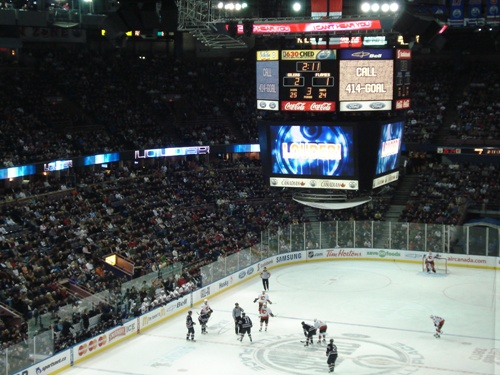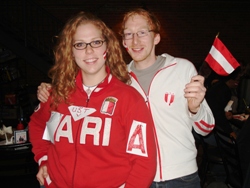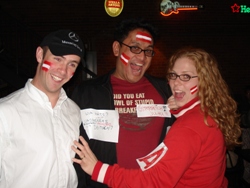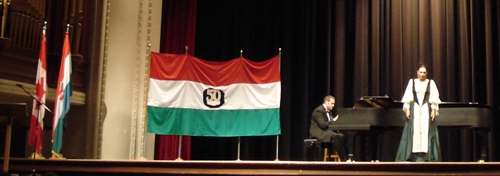Bloody, bloody Edmonton
Ohhhhh noooooo! Five months after my first, well, sort of newspaper appearance I made it into TV. On Tuesday. And I missed it and learned about it only today!
The background is a quite tragic and frightening one. Actually I always felt very safe here, but especially since autumn I've heard about a number of homicides (Toetungsdelikte). First it was some gang relating shootings in the bad areas downtown. Then at Halloween three young men (19, 21, 27) were shot in a downtown club. This weekend saw 3 stabbings within 30 minutes which caused two deaths (article). One victim was a 17 year old boy killed at his own birthday party (and of course those were the most moving reports, seeing the whole school grief-stricken). The other one was a 23 year old father to be who died in Whyte Avenue just in front of the bar Eric works in. By now the number of homicides this year has reached 34 which is about the same as the number as last year (which I was told had set an all time record). Edmonton is the leader in this sad statistic in all of Canada and if I'm right more people were killed in homicides in this city than in traffic accidents. Most of the involved are men in their twenties.
What I find so shocking is the way these things happen. Now it's not about gangs, about bad areas, or about robbery. The five most recent victims were all going out, having a good time, when they by bad luck bump into somebody who it seems was drunk, in a bad mood, looking for trouble. You know, it looks like it's not that there are so many criminals around but that normal people randomly turn into killers at random places. And that I find very, very frightening.
So these days it's the question what could be done. Tuesday noontime (when I was on Whyte Avenue to go to Elephant and Castle for the Barcelona match) a TV team approached me. At first I didn't understand what she was talking about but after she repeated her question I replied, yes, I do go out a lot on Whyte Avenue. She continued whether I feel safe and I answered: "Well I felt pretty safe here but after the last weekend I'm not so sure anymore and I don't know what's going on with all those random stabbings." Finally she asked what the city of Edmonton should do and I was a bit puzzled and spontaneously just said: "I have no clue. I don't think anything can really be done against random stabbings." That was it - and I was quite convinced they wouldn't show it because I mean it was not really a productive statement. (Nevertheless I did watch the news that evening. And now I'm puzzled because I did not see me but someone told me today that my statements were broadcast.)
If I had thought a moment longer I might have added that I don't believe in quick and easy solutions (more police, harsher sentences, ban alcohol). Something like this. But that's what's happening now. First there will be more police on Whyte Avenue (which as a start my be quite good), secondly they think of fixing cameras at key points - and thirdly, and in my opinion, pointlessly, they think about forcing liquor stores to close at 11pm. What is that going to change? Well, then people will buy more before that time or get drunk in bars and pubs instead. In general I think all of this remains a bit on the surface and doesn't touch the root causes - whatever they may be. A professor of criminology suggested this week that the homicides are the dark side of the region's economic boom which brings "young, unattached males with money to spend" into the town (source).
However, despite all of this I think in general Edmonton is still a rather safe city. I won't lock myself at home. But I will be observing extra carefully who is on the street and will try to avoid coming too close to anyone who looks like drunk and trouble, and if unavoidable I will stay as calm and friendly as possible. (After the Halloween shooting I read quite a good article in the university newspaper Gateway which pursued a similar line. article) And now I'm going on and later on out for having a good time. My two choices: A) having fun, senseless small talk and cheap beer with the internationals at a house birthday party or B) having fun, serious conversations and expensive beer at a meeting of the UofA history graduates in O'Byrnes. Hmm.. I'll see.
The background is a quite tragic and frightening one. Actually I always felt very safe here, but especially since autumn I've heard about a number of homicides (Toetungsdelikte). First it was some gang relating shootings in the bad areas downtown. Then at Halloween three young men (19, 21, 27) were shot in a downtown club. This weekend saw 3 stabbings within 30 minutes which caused two deaths (article). One victim was a 17 year old boy killed at his own birthday party (and of course those were the most moving reports, seeing the whole school grief-stricken). The other one was a 23 year old father to be who died in Whyte Avenue just in front of the bar Eric works in. By now the number of homicides this year has reached 34 which is about the same as the number as last year (which I was told had set an all time record). Edmonton is the leader in this sad statistic in all of Canada and if I'm right more people were killed in homicides in this city than in traffic accidents. Most of the involved are men in their twenties.
What I find so shocking is the way these things happen. Now it's not about gangs, about bad areas, or about robbery. The five most recent victims were all going out, having a good time, when they by bad luck bump into somebody who it seems was drunk, in a bad mood, looking for trouble. You know, it looks like it's not that there are so many criminals around but that normal people randomly turn into killers at random places. And that I find very, very frightening.
So these days it's the question what could be done. Tuesday noontime (when I was on Whyte Avenue to go to Elephant and Castle for the Barcelona match) a TV team approached me. At first I didn't understand what she was talking about but after she repeated her question I replied, yes, I do go out a lot on Whyte Avenue. She continued whether I feel safe and I answered: "Well I felt pretty safe here but after the last weekend I'm not so sure anymore and I don't know what's going on with all those random stabbings." Finally she asked what the city of Edmonton should do and I was a bit puzzled and spontaneously just said: "I have no clue. I don't think anything can really be done against random stabbings." That was it - and I was quite convinced they wouldn't show it because I mean it was not really a productive statement. (Nevertheless I did watch the news that evening. And now I'm puzzled because I did not see me but someone told me today that my statements were broadcast.)
If I had thought a moment longer I might have added that I don't believe in quick and easy solutions (more police, harsher sentences, ban alcohol). Something like this. But that's what's happening now. First there will be more police on Whyte Avenue (which as a start my be quite good), secondly they think of fixing cameras at key points - and thirdly, and in my opinion, pointlessly, they think about forcing liquor stores to close at 11pm. What is that going to change? Well, then people will buy more before that time or get drunk in bars and pubs instead. In general I think all of this remains a bit on the surface and doesn't touch the root causes - whatever they may be. A professor of criminology suggested this week that the homicides are the dark side of the region's economic boom which brings "young, unattached males with money to spend" into the town (source).
However, despite all of this I think in general Edmonton is still a rather safe city. I won't lock myself at home. But I will be observing extra carefully who is on the street and will try to avoid coming too close to anyone who looks like drunk and trouble, and if unavoidable I will stay as calm and friendly as possible. (After the Halloween shooting I read quite a good article in the university newspaper Gateway which pursued a similar line. article) And now I'm going on and later on out for having a good time. My two choices: A) having fun, senseless small talk and cheap beer with the internationals at a house birthday party or B) having fun, serious conversations and expensive beer at a meeting of the UofA history graduates in O'Byrnes. Hmm.. I'll see.
relationes - 2006/11/25 02:56
 Well, then people do clap and chant and whistle for some seconds, and then it's done. Nothing permanent. Mission accomplished and back to the usual. Mocking and insulting the opponent is virtually missing. Even in such an intense rivalry as Edmonton and Calgary, which I found quite surprising. Once or twice there were "Calgary sucks" chants but that was it. Compare that to any Austrian (and I guess any European) soccer stadium where the opposing team, city and individual players are constantly subject to mockery and insult. "Salzburger - Arschloecher" and the like, just to mention a harmless example - which, I think, still wouldn't be considered appropriate here.
Well, then people do clap and chant and whistle for some seconds, and then it's done. Nothing permanent. Mission accomplished and back to the usual. Mocking and insulting the opponent is virtually missing. Even in such an intense rivalry as Edmonton and Calgary, which I found quite surprising. Once or twice there were "Calgary sucks" chants but that was it. Compare that to any Austrian (and I guess any European) soccer stadium where the opposing team, city and individual players are constantly subject to mockery and insult. "Salzburger - Arschloecher" and the like, just to mention a harmless example - which, I think, still wouldn't be considered appropriate here. 

